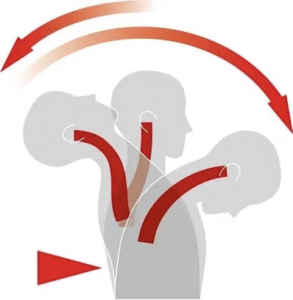In this month of South Simcoe Physiotherapy’s blog post, we are going to discuss the condition of whiplash and how impactful physiotherapy can be in the recovery of it.
Whiplash is one of the most common neck injuries, often resulting from car accidents, sports injuries, or any sudden impact that forces the head to jerk forward and backward rapidly. While it may not always show visible signs of injury, whiplash can have a significant impact on your well-being, causing pain, limited movement, and long-term discomfort if left untreated.
Thankfully, physiotherapy has emerged as one of the most effective, non-invasive ways to treat whiplash, offering a path to pain relief, functional recovery, and long-term health.
What Is Whiplash?
Whiplash is a type of soft tissue injury that affects the neck. It occurs when the head is suddenly and forcefully whipped back and forth, much like the cracking of a whip—hence the name. This rapid motion can damage muscles, ligaments, tendons, discs, and even the joints in the cervical spine (neck region).
Common causes of whiplash include:
- Rear-end car collisions
- Contact sports such as football or rugby
- Falls or slips
- Physical assaults
- Rollercoaster or amusement park rides
Despite being labelled a “mild” injury, the symptoms of whiplash can be persistent and even debilitating for some people.
Symptoms of Whiplash
Whiplash symptoms may appear within hours or days after the injury and can vary in intensity. They include:
- Neck pain and stiffness
- Headaches (often starting at the base of the skull)
- Reduced range of motion in the neck
- Shoulder and upper back pain
- Tingling or numbness in the arms
- Fatigue or dizziness
- Difficulty concentrating or memory issues (in more severe cases)
Some individuals may also experience psychological effects such as anxiety, particularly after traumatic incidents like car accidents.
Why Physiotherapy Is Essential for Whiplash Recovery
Physiotherapy is often a key component of a comprehensive recovery plan for whiplash. Rather than relying solely on medication for temporary relief, physiotherapy addresses the root causes of pain and dysfunction. It combines hands-on treatments, guided exercises, and patient education to support healing and restore mobility.
Here’s how physiotherapy can help with each stage of recovery:
1. Initial Pain Relief and Inflammation Management
In the early phase of treatment, the primary goal is to reduce pain and inflammation. Physiotherapists may use a combination of techniques such as:
- Gentle manual therapy or massage
- Ice or heat therapy
- Ultrasound therapy or TENS (Transcutaneous Electrical Nerve Stimulation)
- Activity modification to reduce strain
These approaches can help decrease muscle tension, improve circulation, and kick-start the healing process.
2. Restoring Neck Mobility and Flexibility
After the initial inflammation subsides, the focus shifts to regaining neck mobility. Whiplash often leads to stiffness and a reduced range of motion in the cervical spine. Stretching and mobilization exercises are introduced gradually to prevent joint stiffness and muscle shortening.
Some commonly prescribed exercises include:
- Neck tilts and rotations
- Shoulder rolls and stretches
- Chin tucks
- Postural correction drills
These exercises help re-establish normal movement patterns and reduce the risk of developing chronic pain or dysfunction.
3. Strengthening Muscles and Preventing Re-injury
As recovery progresses, strengthening exercises are essential. Weak neck and upper back muscles can make you more vulnerable to re-injury. A physiotherapist will design a personalized program to strengthen the deep stabilizing muscles of the neck and upper spine, along with improving shoulder and core strength.
Examples include:
- Isometric neck exercises
- Resistance band routines
- Scapular stabilization drills
- Core activation exercises
This phase also helps restore balance and proprioception—your body’s ability to sense movement and position—especially if dizziness or coordination problems are present.
4. Posture and Ergonomic Education
Poor posture and improper movement habits can worsen whiplash symptoms and delay recovery. A physiotherapist provides advice tailored to your lifestyle, including:
- Proper desk setup for those who work at a computer
- Sleeping positions and pillow recommendations
- Driving posture adjustments
- Safe lifting and carrying techniques
These insights ensure that healing continues outside the clinic and help prevent future issues.
5. Tailored Recovery Plans and Ongoing Support
No two whiplash injuries are the same. A key benefit of physiotherapy is that it’s not a one-size-fits-all approach. Your treatment plan evolves as your condition changes and improves, ensuring the right techniques are used at the right time.
Additionally, physiotherapists provide emotional support and reassurance, especially for those dealing with trauma-related symptoms or fears about returning to normal activities.
How Long Does It Take to Recover from Whiplash?
Recovery time varies depending on the severity of the injury, overall health, and how quickly treatment begins. Mild cases may improve within a few weeks, while more complex cases can take several months. Early and consistent physiotherapy often leads to faster and more complete recovery.
When to See a Physiotherapist
You should seek physiotherapy as soon as possible after a whiplash injury—especially if you experience:
- Persistent or worsening neck pain
- Reduced mobility
- Headaches that don’t resolve
- Dizziness or blurred vision
- Tingling in your arms or fingers
Prompt treatment not only alleviates current symptoms but also prevents the development of chronic whiplash-associated disorders.
Final Thoughts
Whiplash is more than just a sore neck—it can have lasting effects on your physical and mental well-being if not properly managed. Physiotherapy plays a vital role in healing by addressing pain, restoring function, and helping you return to your normal activities safely and confidently.
If you or a loved one is experiencing symptoms of whiplash, don’t wait. Reach out to South Simcoe Physiotherapy Clinic in Alliston and a physiotherapist will conduct a comprehensive evaluation and personalized treatment plan.
Recovery is possible—with the right support and care, you can get back to living life without limits. Book your appointment.




